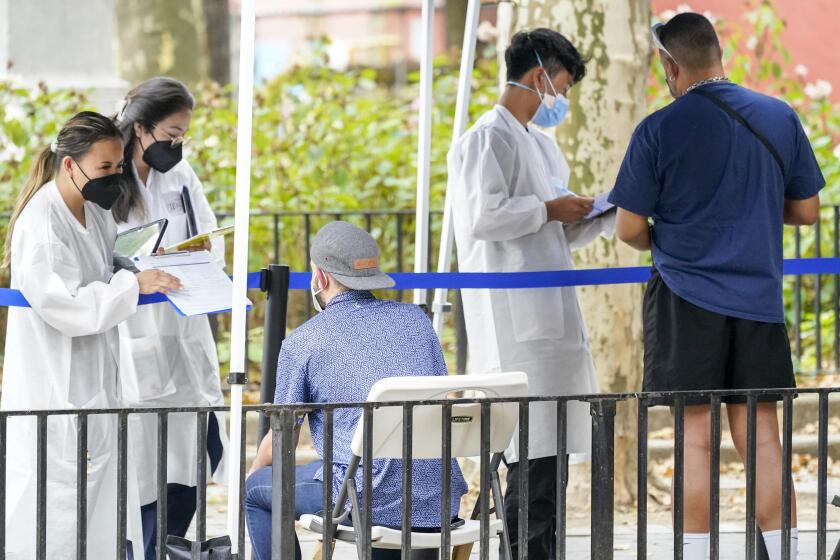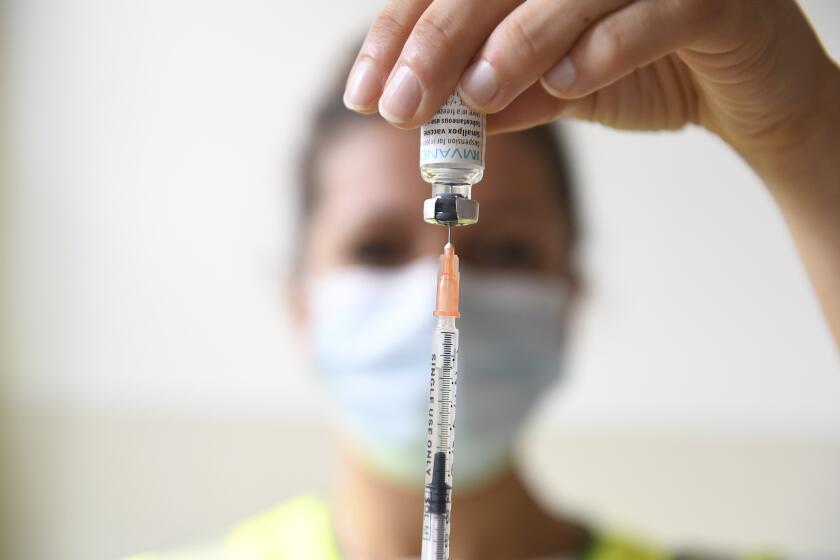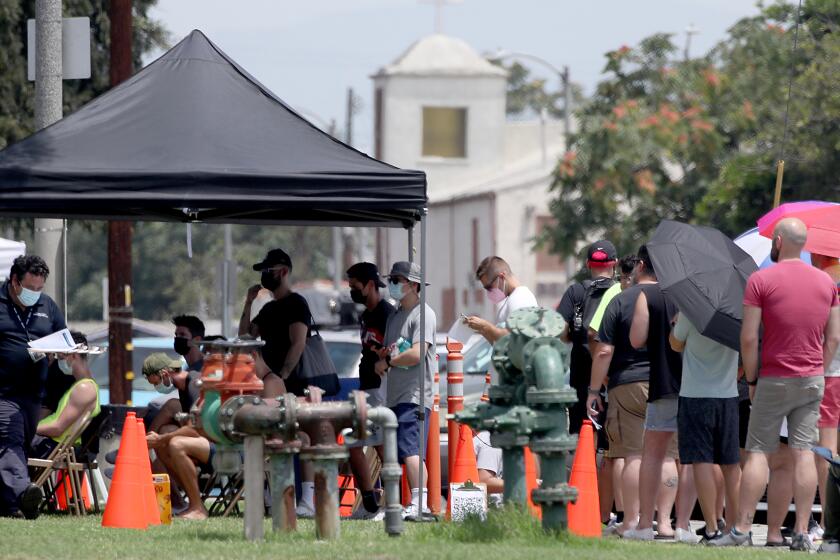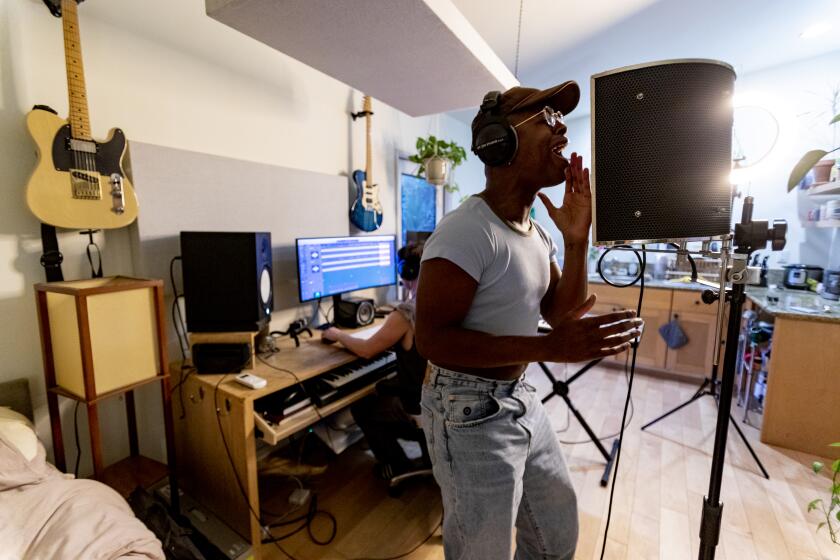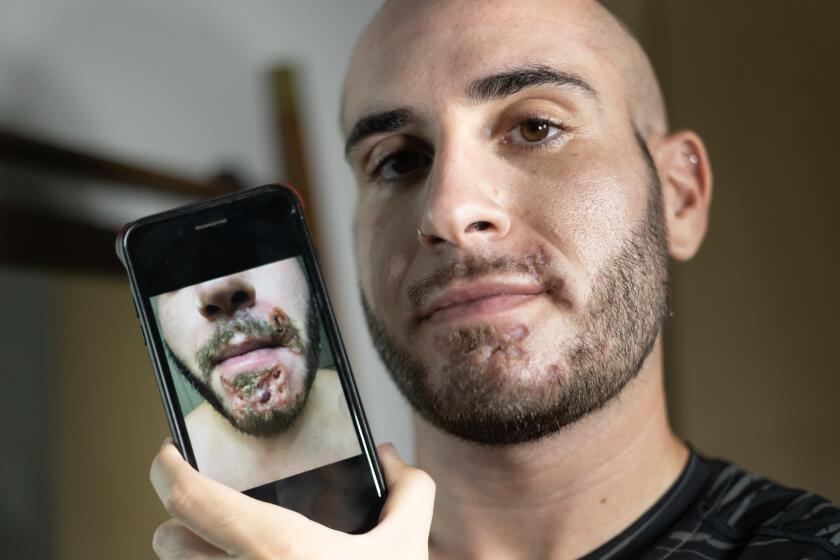Fears of losing battle to control monkeypox in California, U.S. as cases surge

- Share via
Monkeypox cases are rising exponentially in some gay and bisexual communities, dimming hopes that officials can quickly gain control of the virus that has the potential to establish a lasting foothold in the United States.
The U.S. is reporting about 450 monkeypox cases a day for the seven-day period that ended Tuesday, according to Our World in Data. That’s double the rate from two weeks earlier. Los Angeles County reported 683 cumulative cases as of Tuesday — doubling in the last 10 days. An additional 29 cases were reported in the county on Wednesday.
More than 1,800 monkeypox cases have been reported in California as of Wednesday, according to a Times tally of data from L.A. and San Francisco counties and the state Department of Public Health.
“When you look at the rates of increase, you can see that it’s really approaching an exponential curve. And unfortunately, it’s going to become harder and harder to control the ... higher these numbers get,” said Dr. Peter Chin-Hong, an infectious-disease expert at UC San Francisco.
Doctors fear that an increased spread could result in the virus becoming endemic in the wild animal population, meaning it would be virtually impossible to eliminate as a new disease of concern in the U.S.
“Hopefully, we can contain this. But if not, it may bleed over into other populations,” Chin-Hong said.
About 10% of monkeypox cases result in hospitalization, Chin-Hong said, usually for severe pain or a super-infection. “There have been a couple of deaths in Spain, one in Brazil, outside of the African continent,” Chin-Hong said.
And “although we’re not seeing many deaths,” Chin-Hong said, monkeypox infections are “really causing a lot of suffering.” The pain can be excruciating and cause patients to have trouble sleeping, walking, eating, drinking or going to the bathroom.
Here are some challenges in controlling the global outbreak.
Who is eligible to get the monkeypox vaccination in Los Angeles right now? And how to do you get one? Here’s what to know.
Rapid spread in high-risk settings
Cases are rising steeply among men who have sex with men and transgender people who have sex with men, Chin-Hong said. About 98% to 99% of cases are among people in these groups.
The spread of monkeypox cases also has been amplified by LGBTQ pride events, specifically in gay saunas and at pool parties where there is intimate skin-to-skin contact, Chin-Hong said. The virus is not transmitted through pool water and generally not transmitted through public surfaces. It can, however, be transmitted through infected bedsheets and other household surfaces where there is continued exposure.
As monkeypox cases across California and the U.S. continue to rise, experts address some of the concerns and questions swirling about virus, and what activities people should consider risky, or not.
Failure to diagnose quickly
Monkeypox can be hard for medical professionals to diagnose early, especially because it’s been virtually unheard of in the U.S. until recently.
“The rash can really look very innocent when it begins, like a pimple or like an ingrown hair. So that’s really why it’s really difficult for clinicians to diagnose it,” Chin-Hong said. “If you can diagnose people, you can keep them away from people [who] are not infected.”
Chin-Hong urged clinicians to be more suspicious and take samples of lesions for testing. Even if there’s not a lot of skin disease, clinicians should take samples to test for monkeypox in the rectum, urethra and mouth, he added.
For instance, a person infected with monkeypox can test positive for the virus from a sample from the urethra, but the infection might not be detected on the skin.
“A lot of people are swabbing the skin like there’s no tomorrow. But if the disease is in your mouth or in your anal area, you’re going to have a false negative because you’re not going where the disease is,” Chin-Hong said.
According to the Centers for Disease Control and Prevention, monkeypox symptoms typically start within three weeks of exposure. The illness can last two to four weeks.
About 80% experience flu symptoms, but about 20% don’t, Chin-Hong said. The telltale rash appears in nearly all monkeypox patients; among many, it appears in the anus and genital regions first, then moves toward the face, arms, mouth, trunk, palms and soles.
San Francisco resident David Watson said he contracted the virus after hugging and kissing a friend on the cheek. His friend had a lesion on his cheek he assumed was an ingrown hair or pimple. Within five days, Watson had developed symptoms that became so painful that he went to a hospital.
“I ended up in the ER three times over the course of 4½ days with excruciating pain that opioids could barely touch. It took two doses of morphine my first time in the hospital to knock down the pain to a manageable level,” he said. “It didn’t matter whether I was sitting, standing or lying down, the pain was off the charts.”
Federal officials on Tuesday announced that they will stretch limited vaccine supplies by giving one-fifth the current dosage.
Limited vaccine supply
Federal officials have come under criticism for moving too slowly to increase vaccines but on Tuesday announced a new plan to stretch the limited supply of the Jynneos vaccine, which can help protect against monkeypox. The plan involves shrinking the dosage of the vaccine to one-fifth the current measurement by administering the shot intradermally (between layers of skin) as opposed to subcutaneously (into the underlying fat).
But even federal officials acknowledge the new strategy won’t end the vaccine shortage.
“We will likely still run out of vaccines before we run out of arms,” Dr. Demetre Daskalakis, the White House national monkeypox response deputy coordinator, said at a briefing Tuesday.
Health officials say ample vaccine supply is vital to control the monkeypox outbreak.
“Every week you wait, more and more people are infecting a circle around them. And those circles around them are infecting circles around each of them,” Chin-Hong said. “We’ve been treating so many patients this week, much more than previous weeks.”
“I think vaccines are the way out of this,” he said. “And monkeypox in the beginning ... it looks like nothing, like a pimple. It’s really tough to diagnose early cases clinically. So when it’s dramatic, you’ve already probably exposed a lot of people.”
Kim Saruwatari, director of public health for Riverside County, said there is a particular need for additional vaccines in the Coachella Valley because of international sex tourism in Palm Springs.
“This area has 11 sex clubs, the largest number in any Southern California jurisdiction,” Saruwatari said during a legislative hearing Tuesday. “Because of this, Palm Springs may well be the source for many cases in other jurisdictions.”
Gay and bisexual men, transgender people and others worried about monkeypox are strategizing to protect themselves as they wait for vaccinations.
Difficult messaging
It has been difficult to balance messaging that does not stigmatize gay and bisexual men and transgender people who have sex with men — those who are most likely to be infected with monkeypox — while also stating plainly ways to reduce the risk of contracting the virus.
“I think it’s hard to say, ‘Limit sexual activity or don’t have sex,’ because you want to be as sex-positive as possible,” Chin-Hong said. “But I think those are the messages that some people are starting to see.”
The San Francisco AIDS Foundation has suggested “skipping the dark, back rooms at parties if they’re super crowded and there’s no way to control who you’re bumping up against and rubbing skin-to-skin with.” People can also reduce risk by having “open and honest conversations about monkeypox symptoms and possible exposures” before having sex.
“It might be time to hang up the group sex and saunas until we all get shots one and two of the vaccine. This is temporary and out of a love for group sex and those who enjoy it,” read another guide to having safer sex.
Experts also are seeking to dispel unfounded fears about how you can get monkeypox. Officials aren’t seeing spread from activities such as changing clothes in a dressing room or casual encounters at a crowded festival, or from gym equipment.
“Even though it’s technically possible to transmit monkeypox on surfaces (like if you share a towel with someone who has monkeypox), it’s less likely. There isn’t much risk of getting monkeypox from sharing things like toilet seats, pools and gym equipment,” the San Francisco AIDS Foundation said.
There’s no risk of getting monkeypox from public encounters such as passing by someone on the subway. It also would be difficult for monkeypox to be transmitted during a massage unless there is a visible lesion in any skin-on-skin contact.
“Monkeypox risk is really in the intimate settings,” Chin-Hong said.
For many Californians suffering from monkeypox, getting Tpoxx has not been simple. The smallpox drug has not yet been approved by the FDA to treat monkeypox.
It’s hard to get treatment
There is one antiviral — tecovirimat, also known as Tpoxx — that can be administered to help ease symptoms. However, many health providers have had difficulty accessing the drug, which is suggested for use only in severe cases or for people with certain high-risk health factors. CDC officials have said they are working to streamline the process so more people can get the drug.
Tpoxx — administered through three pills twice a day for two weeks or intravenously — is approved by the Food and Drug Administration to treat human smallpox disease, but its use to treat monkeypox is not approved by the agency. As a result, getting Tpoxx is complicated and involves contacting a state health department or the CDC and having a patient fill out an informed consent form, which takes an hour.
Federal officials have said they’re developing randomized control trials to determine the safety and efficacy of Tpoxx to treat monkeypox in humans. Although it has been shown to be effective in animal models of monkeypox, without such data for humans, “we will not know whether tecovirimat would benefit, harm or have no effect on people with monkeypox disease,” officials from the FDA and CDC wrote in a perspective article for the New England Journal of Medicine.
Dan Tavares Arriola, a City Council member in Tracy, Calif., said when he tested positive for monkeypox in late July, he faced a labyrinth of bureaucracy as he attempted to receive treatment for himself and a vaccine for his exposed partner.
“I’m a lawyer. I’m an elected official. I have experience on how to advocate for myself and others and how to navigate the systems,” Arriola said. “I can only imagine how much more challenging it is for those who don’t have that experience or face different barriers like language barriers.”
Times staff writers Grace Toohey, Emily Alpert Reyes and August Brown contributed to this report.
More to Read
Sign up for Essential California
The most important California stories and recommendations in your inbox every morning.
You may occasionally receive promotional content from the Los Angeles Times.
